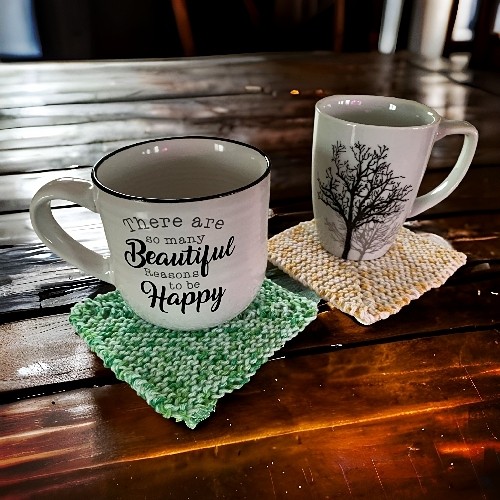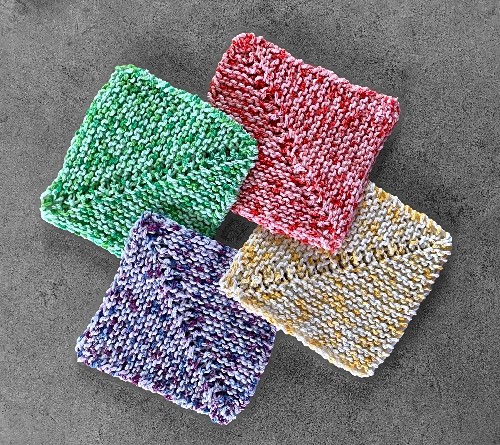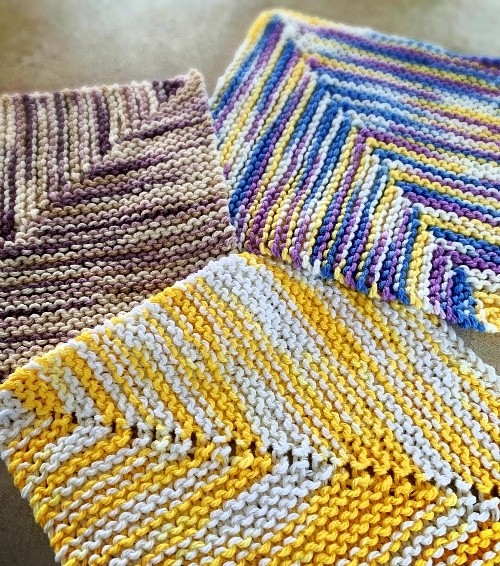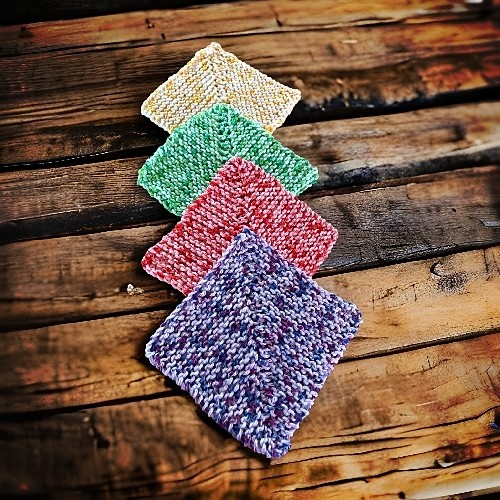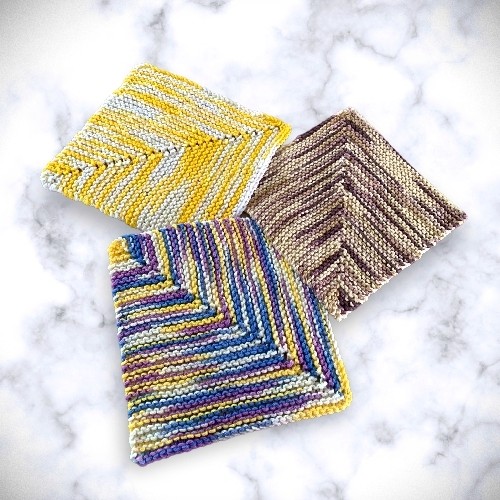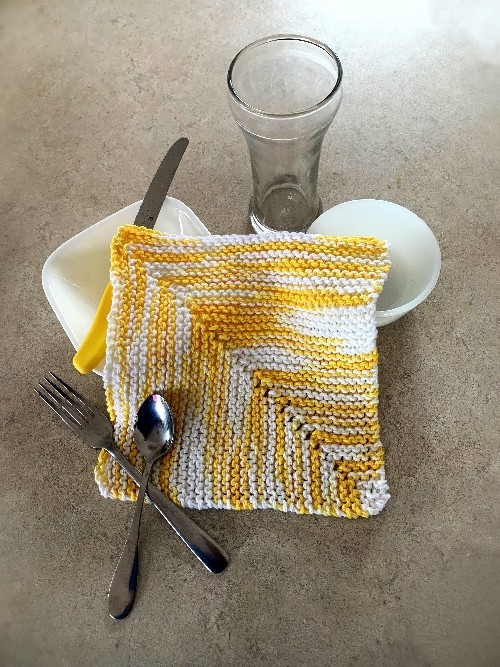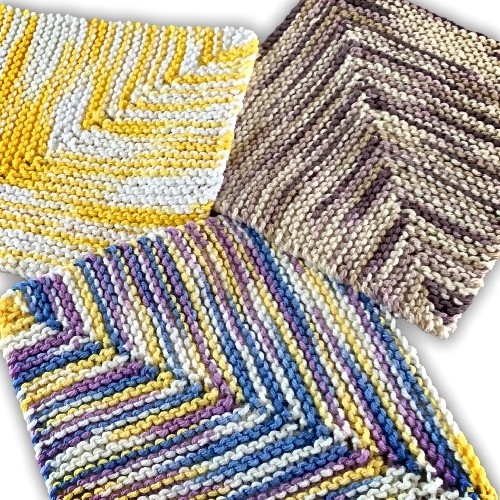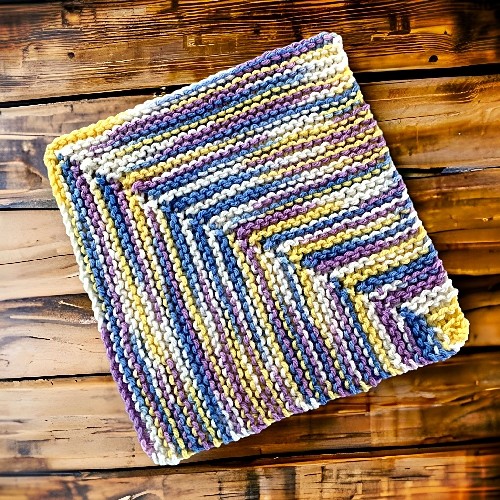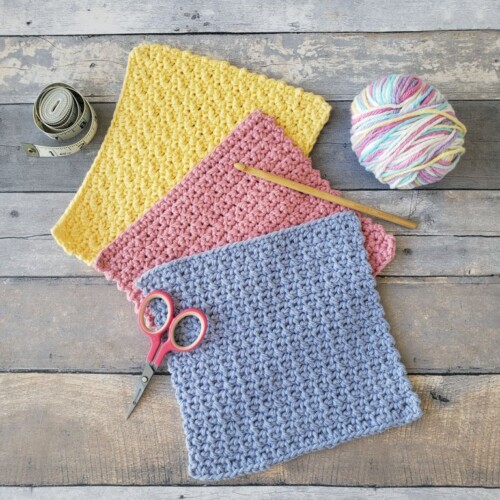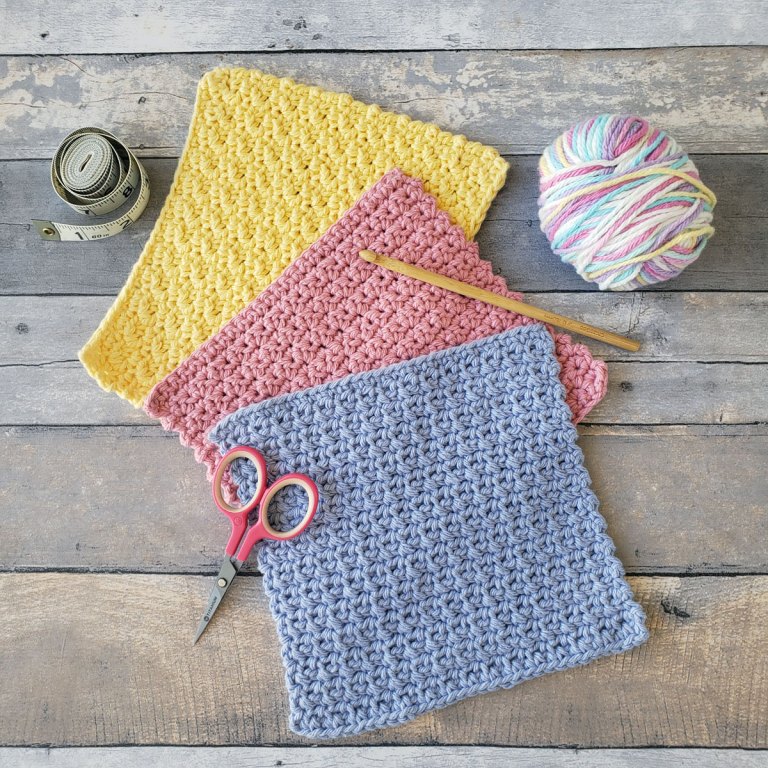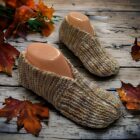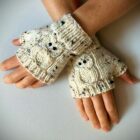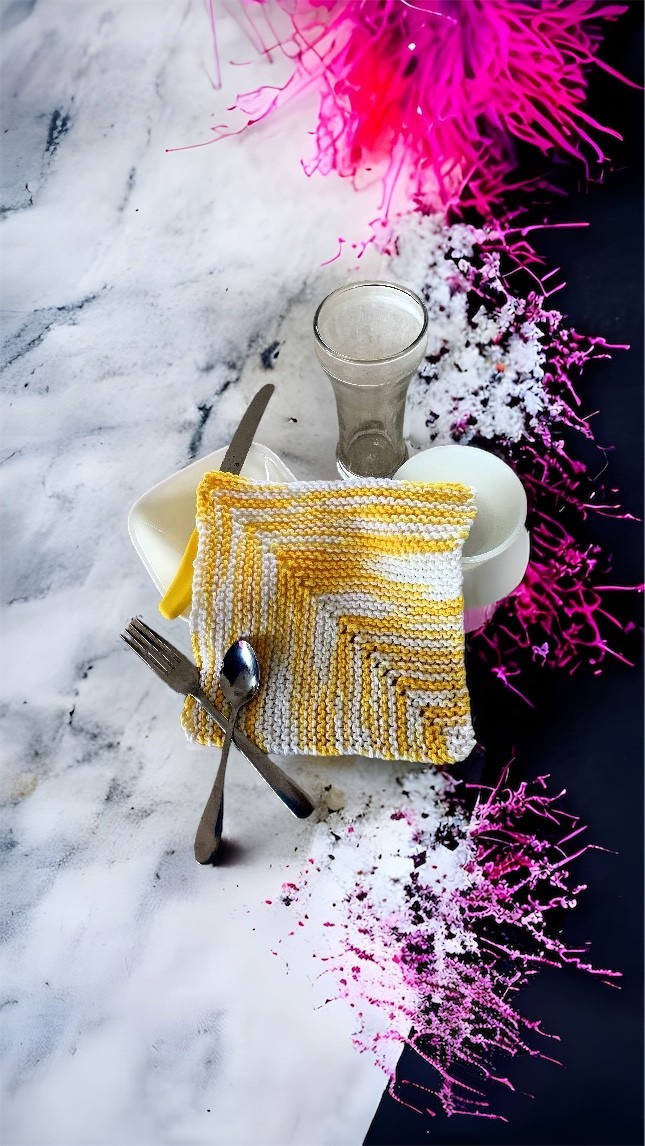
This knitting pattern is very versatile and can be made to be any size of square. For myself, I like it as a dishcloth. But when I started to knit up samples for the photos I realized that this design could transfer into any thing that can be square. Regardless of the size, because of the method of making it, it will always be square regardless of how many, or few, stitches are cast on at the outset.
And no need to worry about picking up stitches or any other difficult techniques. If you can knit and cast on and cast off, you can make this. It’s not complicated at all.
For myself, I found that 32 stitches made for the perfect size dishcloth and used a little less than one of the smaller balls of cotton yarn. I like mine to be bigger but not unmanageably so. I also found that making a coaster or mini face scrubber, took about 18 stitches. These are just approximate cast on stitch counts. I found that there is some variation in the worsted weight (medium 4) yarn thickness. You may need to add 2 or 3 more cast on stitches if it’s on the thinner side.
I’ve written the pattern to make a dishcloth so started with 32 stitches cast on. A quick tip, if you use a size smaller needle (4 mm or US 6) to cast on, then switch back to the 5 mm (US 8) the starting edge looks a bit more finished and tight.
Another plus about this pattern, I finally designed something that really highlights variegated yarn. I have a great appreciation for the colour changing yarns that are available (I do not have similar feelings towards self striping yarn, but that’s a rant for another time). I found that the variegated yarn did really well with smaller size squares, though I like the pooling of colours when making the larger sized dishcloths as well.
And to sooth my quest for sameness, these washcloths are the same on both sides!! Both sides look pretty much the same. I know in the scheme of things this matters very little, but it somehow screams “correct” to me. I’m weird. I know.
If you’re looking for an ad free pattern you can download to your computer, tablet or phone you can get that here – this website at One Piece Knitted Dishcloth and Coasters – Great Knitting Pattern for Beginners, LoveCrafts, my Etsy shop or Ravelry for a small fee. It is also available on Amazon Kindle and as a paperback.
Another way to avoid ads and pop-ups, get instant, PRINTABLE downloads of this pattern and others, is by becoming a Member on this website. When you become a Website Supporter for $3/month, you’ll gain access to exclusive member only posts. These posts contain one click downloads of the patterns. Simply click the Download & Print button. The PDF will automatically download to your computer or smart device. You can then read it on your device or print it at your leisure. You can download as many patterns as you like for the same $3 each month. You can go to this page to learn more, become a member and support my work… Exclusive Member Area
And, yes. I know this pattern becomes very obvious in how to make it once you start knitting. I wrote it out in full regardless, as some people (the few but very vocal) have a tendency to contact me if even the most obvious thing is not mentioned in my patterns. I’m trying to avoid these critical emails, just so you know.
It’s so obvious that you may be able to knit this without the pattern at all. That’s why I made the video. I’m sure some of the more experienced knitters out there will watch the first couple minutes of the video below and be like, “Ya. I got this.”
Things You Need
Size 8 US (5 mm) knitting needles
1 3/4 oz (42g) ball of 100% cotton worsted weight yarn
Large sewing needle (for working in the ends)
Gauge isn’t really important for this project as sizing is approximate.
Abbreviations
K – Knit
st – stitch
That’s it! This is a VERY simple pattern.
The Pattern
Cast on 32 (You will always have 32 stitches on your needle when the right side is facing you)
Row 1 – 2: Knit across
Row 3: K31. Leave the last stitch unworked. Turn.
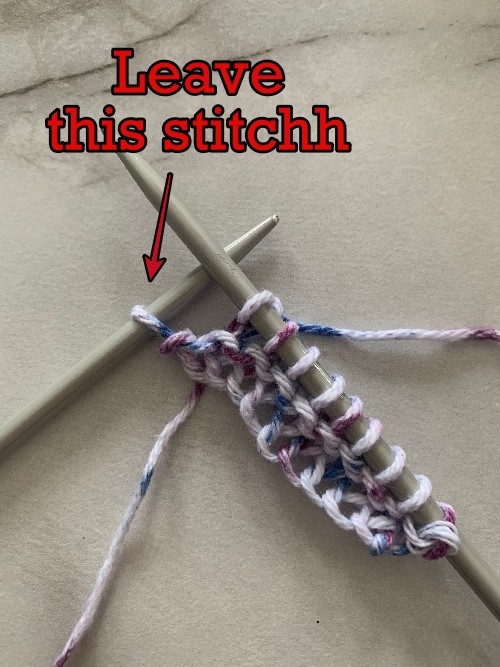
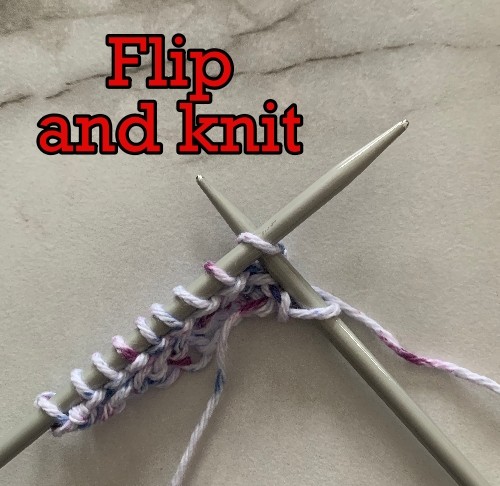
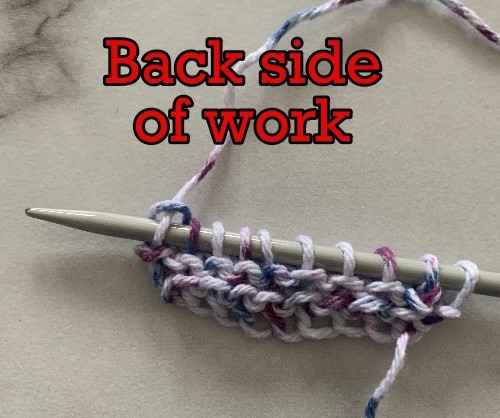
Row 4: K31.
Row 5: K30. Leave the last 2 stitches unworked. Turn.
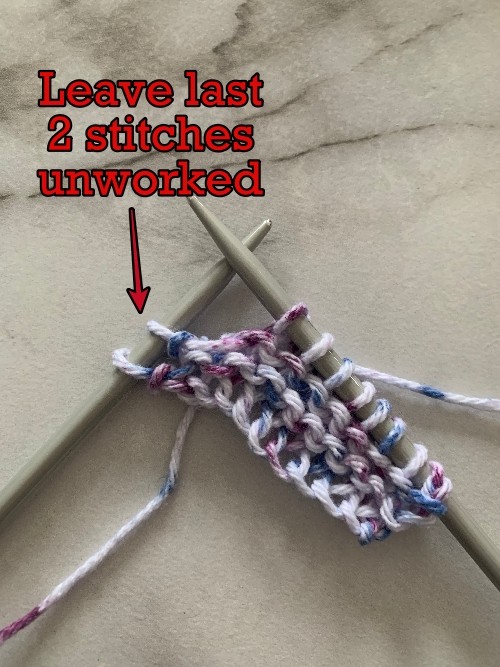
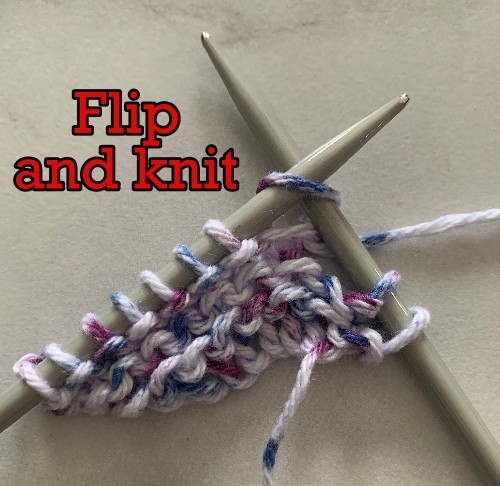
Row 6: K30.
Row 7: K29. Leave the last 3 stitches unworked. Turn.
Row 8: K29.
Row 9: K28. Leave the last 4 stitches unworked. Turn.
Row 10: K28.
Row 11: K27. Leave the last 5 stitches unworked. Turn.
Row 12: K27.
Row 13: K26. Leave the last 6 stitches unworked. Turn.
Row 14: K26.
Row 15: K25. Leave the last 7 stitches unworked. Turn.
Row 16: K25.
Row 17: K24. Leave the last 8 stitches unworked. Turn.
Row 18: K24.
Row 19: K23. Leave the last 9 stitches unworked. Turn.
Row 20: K23.
Row 21: K22. Leave the last 10 stitches unworked. Turn.
Row 22: K22.
Row 23: K21. Leave the last 11 stitches unworked. Turn.
Row 24: K21.
Row 25: K20. Leave the last 12 stitches unworked. Turn.
Row 26: K20.
Row 27: K19. Leave the last 13 stitches unworked. Turn.
Row 28: K19.
Row 29: K18. Leave the last 14 stitches unworked. Turn.
Row 30: K18.
Row 31: K17. Leave the last 15 stitches unworked. Turn.
Row 32: K17.
Row 33: K16. Leave the last 16 stitches unworked. Turn.
Row 34: K16.
Row 35: K15. Leave the last 17 stitches unworked. Turn.
More of my stuff on Etsy:
You can make a widget like this for your blog or website, too.
Instructions are on my website here: How to Display Etsy Items on Your Website
Row 36: K15.
Row 37: K14. Leave the last 18 stitches unworked. Turn.
Row 38: K14.
Row 39: K13. Leave the last 19 stitches unworked. Turn.
Row 40: K13.
Row 41: K12. Leave the last 20 stitches unworked. Turn.
Row 42: K12.
Row 43: K11. Leave the last 21 stitches unworked. Turn.
Row 44: K11.
Row 45: K10. Leave the last 22 stitches unworked. Turn.
Row 46: K10.
Row 47: K9. Leave the last 23 stitches unworked. Turn.
Row 53: K6. Leave the last 26 stitches unworked. Turn.
Row 48: K9.
Row 49: K8. Leave the last 24 stitches unworked. Turn.
Row 50: K8.
Row 51: K7. Leave the last 25 stitches unworked. Turn.
Row 52: K7.
Row 54: K6.
Row 55: K5. Leave the last 27 stitches unworked. Turn.
Row 56: K5.
Row 57: K4. Leave the last 28 stitches unworked. Turn.
Row 58: K4.
Row 59: K3. Leave the last 29 stitches unworked. Turn.
Row 60: K3.
Row 61: K2. Leave the last 30 stitches unworked. Turn.
Row 62: K2.
Row 63: K1. Leave the last 31 stitches unworked. Turn.
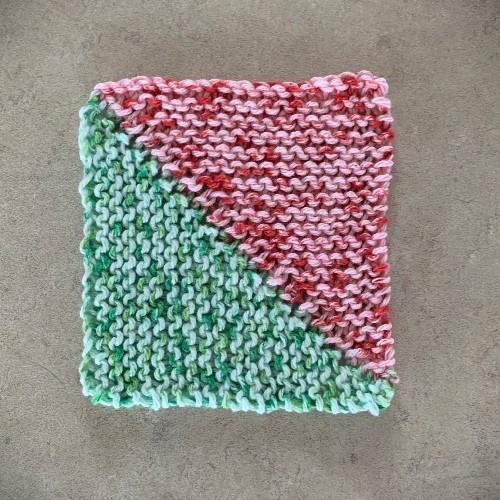
Halfway Point
If you would like the other half of your square to use a different colour like shown above, attach it now.
Row 64: K1.
Row 65: K2. Leave the last 30 stitches unworked. Turn.
Row 66: K2.
Row 67: K3. Leave the last 29 stitches unworked. Turn.
Row 68: K3.
Row 69: K4. Leave the last 28 stitches unworked. Turn.
Row 70: K4.
Row 71: K5. Leave the last 27 stitches unworked. Turn.
Row 72: K5.
Row 73: K6. Leave the last 26 stitches unworked. Turn.
Row 74: K6.
Row 75: K7. Leave the last 25 stitches unworked. Turn.
Row 76: K7.
Row 77: K8. Leave the last 24 stitches unworked. Turn.
Row 78: K8.
Row 79: K9. Leave the last 23 stitches unworked. Turn.
Row 80: K9.
Row 81: K10. Leave the last 22 stitches unworked. Turn.
Row 82: K10.
Row 83: K11. Leave the last 21 stitches unworked. Turn.
Row 84: K11.
Row 85: K12. Leave the last 20 stitches unworked. Turn.
Row 86: K12.
Row 87: K13. Leave the last 19 stitches unworked. Turn.
Row 88: K13.
Row 89: K14. Leave the last 18 stitches unworked. Turn.
Row 90: K14.
Row 91: K15. Leave the last 17 stitches unworked. Turn.
Row 92: K15.
Row 93: K16. Leave the last 16 stitches unworked. Turn.
Row 94: K16.
Row 95: K17. Leave the last 15 stitches unworked. Turn.
Row 96: K17.
Row 97: K18. Leave the last 14 stitches unworked. Turn.
Row 98: K18.
Row 99: K19. Leave the last 13 stitches unworked. Turn.
Row 100: K19.
Row 101: K20. Leave the last 12 stitches unworked. Turn.
Row 102: K20.
Row 103: K21. Leave the last 11 stitches unworked. Turn.
Row 104: K21.
Row 105: K22. Leave the last 10 stitches unworked. Turn.
Row 106: K22.
Row 107: K23. Leave the last 9 stitches unworked. Turn.
Row 108: K23.
Row 109: K24. Leave the last 8 stitches unworked. Turn.
Row 110: K24.
Row 111: K25. Leave the last 7 stitches unworked. Turn.
Row 112: K25.
Row 113: K26. Leave the last 6 stitches unworked. Turn.
Row 114: K26.
Row 115: K27. Leave the last 5 stitches unworked. Turn.
Row 116: K27.
Row 117: K28. Leave the last 4 stitches unworked. Turn.
Row 118: K28.
Row 119: K29. Leave the last 3 stitches unworked. Turn.
Row 120: K29.
Row 121: K30. Leave the last 2 stitches unworked. Turn.
Row 122: K30.
Row 123: K31. Leave the last stitch unworked. Turn.
Row 124: K31.
Row 125: K32.
Cast off on the WRONG side.
Hints and Tips
If you would like to make smaller squares for coasters or pot scrubbers, cast on fewer stitches. The basic idea for the pattern is to always leave one less stitch done every other row. Once you’re down to one stitch, knit one extra stitch every other row.
I know I mentioned this in the intro but it deserves repeating. If you use a size smaller needle (4 mm or US 6) to cast on, then switch back to the 5 mm (US 8) the starting edge looks a bit more finished and tight.
You don’t have to use cotton yarn if you’re going to make coasters. An acrylic or wool blend would also work well. And you can also use up some of your yarn stash this way too. Great little things to sell at a garage sale, or craft fair and recoup a little of the money already spent on the yarn.
Use these squares for anything! As long as your yarn is the same thickness and type, all acrylic let’s say, you could easily use up your last little yarn bits to make an afghan or throw blanket. I don’t quilt but I know that triangles and squares make up a good portion of quilt designs. Knitting squares that are two colours along the diagonal put together the solid coloured squares could make some very interesting patterns.
These also make good trivets or pot holders for taking things out of the oven, but only if… they are NOT wet and are made of 100% cotton. Any acrylic or polyester blend will melt to the pot and possible fingers, counter tops or tables. And ain’t nobody got time for that!!
Like all my work, you are permitted to sell, give away or keep whatever physical items you make using this pattern. You do NOT have permission to copy or redistribute this pattern (or any of my patterns) in any form either digitally or physically. That includes printed copies of the pattern either as photos or any file format.

